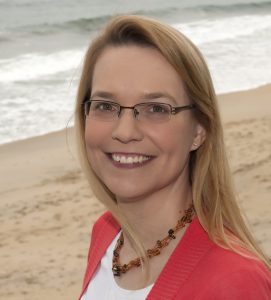Dr. Kelly Benoit-Bird, MBARI
Moss Landing Marine Labs Seminar Series - March 15th, 2018
Hosted by the Vertebrate Ecology Lab
MLML Seminar Room, 4pm
Open to the public
 Dr. Kelly Benoit-Bird is a Senior Scientist at the Monterey Bay Aquarium Research Institute. She received a B.S. in Aquatic Ecology from Brown University in 1998 and a Ph.D. in Zoology from the University of Hawaii at Manoa 2003. She spent a year as Post-Doctoral Fellow at the Hawaii Institute of Marine Biology before joining the faculty of Oregon State University in 2004 where she served was a professor of Oceanography until 2016. Kelly is the recipient of a MacArthur Fellowship, a Fellow of the Acoustical Society of America, and an IEEE Oceanic Engineering Society Distinguished Lecturer. She recently served on the Scientific Steering Committee for the International Council for the Exploration of the Sea Symposium on Marine Ecosystem Acoustics, as an organizer for the National Academy of Sciences Kavli Frontiers of Science Symposium, and as Chief Scientist for an Office of Naval Research Basic Research Challenge. Her research explores the ecological role of spatial and temporal dynamics in pelagic marine ecosystems from the surface to the deep sea. Her collaborative, interdisciplinary approach to understanding ocean ecosystems combines acoustic technologies with other tools including optical sampling, animal tagging, and behavioral modeling. Her work is changing our understanding of how ocean animals including zooplankton, fish, squid, seabirds, and marine mammals make their living.
Dr. Kelly Benoit-Bird is a Senior Scientist at the Monterey Bay Aquarium Research Institute. She received a B.S. in Aquatic Ecology from Brown University in 1998 and a Ph.D. in Zoology from the University of Hawaii at Manoa 2003. She spent a year as Post-Doctoral Fellow at the Hawaii Institute of Marine Biology before joining the faculty of Oregon State University in 2004 where she served was a professor of Oceanography until 2016. Kelly is the recipient of a MacArthur Fellowship, a Fellow of the Acoustical Society of America, and an IEEE Oceanic Engineering Society Distinguished Lecturer. She recently served on the Scientific Steering Committee for the International Council for the Exploration of the Sea Symposium on Marine Ecosystem Acoustics, as an organizer for the National Academy of Sciences Kavli Frontiers of Science Symposium, and as Chief Scientist for an Office of Naval Research Basic Research Challenge. Her research explores the ecological role of spatial and temporal dynamics in pelagic marine ecosystems from the surface to the deep sea. Her collaborative, interdisciplinary approach to understanding ocean ecosystems combines acoustic technologies with other tools including optical sampling, animal tagging, and behavioral modeling. Her work is changing our understanding of how ocean animals including zooplankton, fish, squid, seabirds, and marine mammals make their living.
Resolving the Food Paradox in the Sea
The average concentrations of biota in the ocean are generally low, a critical problem for ocean consumers. When we examine the biology with new tools guided by the predators themselves, we find that instead of being relatively devoid of life, the ocean is peppered with narrow hot-spots of activity. From the surface ocean to the deep sea and animals ranging from plankton and fish to squid and whales, small patches of plenty have impacts on ecosystems disproportionate to their contribution to the total biomass. These small aggregations provide the key to solving experimentally demonstrated feeding paradoxes as well providing a mechanism for evolution in an apparently isotropic environment where there are no obvious barriers to gene flow, Hutchinson’s “Paradox of Plankton”.

